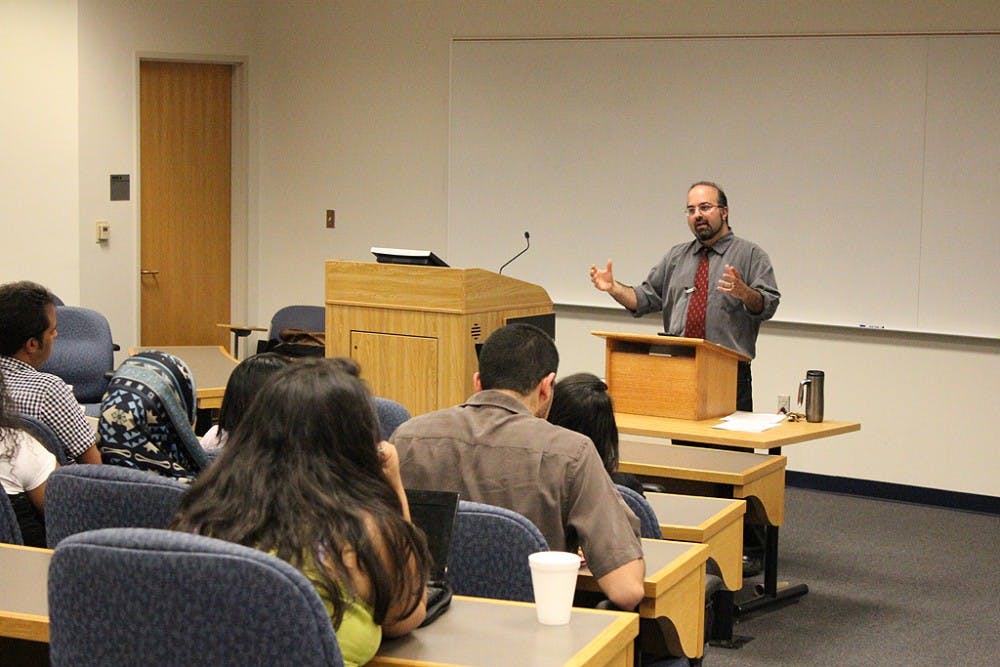Muslims should engage in all avenues of social justice rather than solely focus on their own persecution, said Omid Safi, the keynote speaker at Duke’s Islamic Awareness Week.
Safi, Religion ’00 and professor of Islamic studies at the University of North Carolina at Chapel Hill, said his preferred method of promoting Islam and its ideals does not focus on protesting injustices inflicted on Muslims but instead working against injustices done to all communities. This philosophy is inspired by the teachings of Martin Luther King, Jr. Safi, who is considered a leader of the progressive Muslim debate, spent 11 years studying at Duke and co-founded Duke’s Muslim Student Association in 1988.
“The question we have to ask today is not ‘If we rise up for justice for others, what will happen to us?’” Safi said. “The question we have to ask is ‘If we do not rise up, what will happen to them?’”
The professor, whose research interests include Islamic mysticism, delivered a speech about peace and justice to about 35 students from Duke, UNC-Chapel Hill and North Carolina State University at the Divinity School Thursday. Safi’s speech was the culmination of the annual MSA-sponsored week, which is held at campuses nationwide to promote awareness about issues pertaining to Islam.
In his speech, Safi noted how national Muslim organizations primarily exist to broadcast injustices and prejudice affecting Muslims equally emphasizing the positive accomplishments and daily concerns of Muslims. Instead, these groups should focus on broader social issues and also communicate the strengths of the Muslim community.
“Islamic tradition does stand for something,” Safi said. “It stands ultimately... for a twin mandate of justice—social justice that refuses to stop at gates of our own community—and a divine sense of love and mercy.”
Freshman Shajuti Hossain said she shares Safi’s ideals and appreciates his message of promoting social justice above self interest.
“He encourages us to actively show through example what Islam is rather than what it’s not and how we’re also American and have American values,” she noted.
Above anything, current leaders of Muslim organizations in America want to be invited to the White House or Department of State to increase their political visibility, though for some leaders the invitation can be uncomfortable, Safi said. He was once asked to the Department of State for a Ramadan-related event and declined.
“I said, ‘I will come when you stop killing my people,’” he added. “They said, ‘We don’t appreciate your attitude.’ And I said, ‘I don’t appreciate you killing my people.’”
Safi said most of the Republican presidential candidates have a shaky understanding of American foreign policy, with the exception of Ron Paul, R-Texas and Medicine ’61. He noted Paul’s willingness to diminish our military involvement.
Attendance at Islamic Awareness cultural events had been strong throughout the week, said MSA education chair Noreen Khan, a sophomore.
“We feel as citizens we should take responsibility to inform people of our culture, beliefs and intellectual thoughts,” Khan said. “Islamic Awareness Week is a great way to inform people and use this time while people are on a college campus to teach them about us.”
Religious leaders need to speak up more on war and poverty issues, Safi added.
“When we appear before Allah, yes, we will be asked, ‘Did you pray, did you fast?’” he said. “But we will also be asked, ‘Where did your society puts its food, its resources, its money? Did you support that military-industrial complex that Eisenhower and Martin [Luther King] warned us about? Or did you take that and put it in the wrinkled stomachs of God’s children?’”
Get The Chronicle straight to your inbox
Signup for our weekly newsletter. Cancel at any time.

